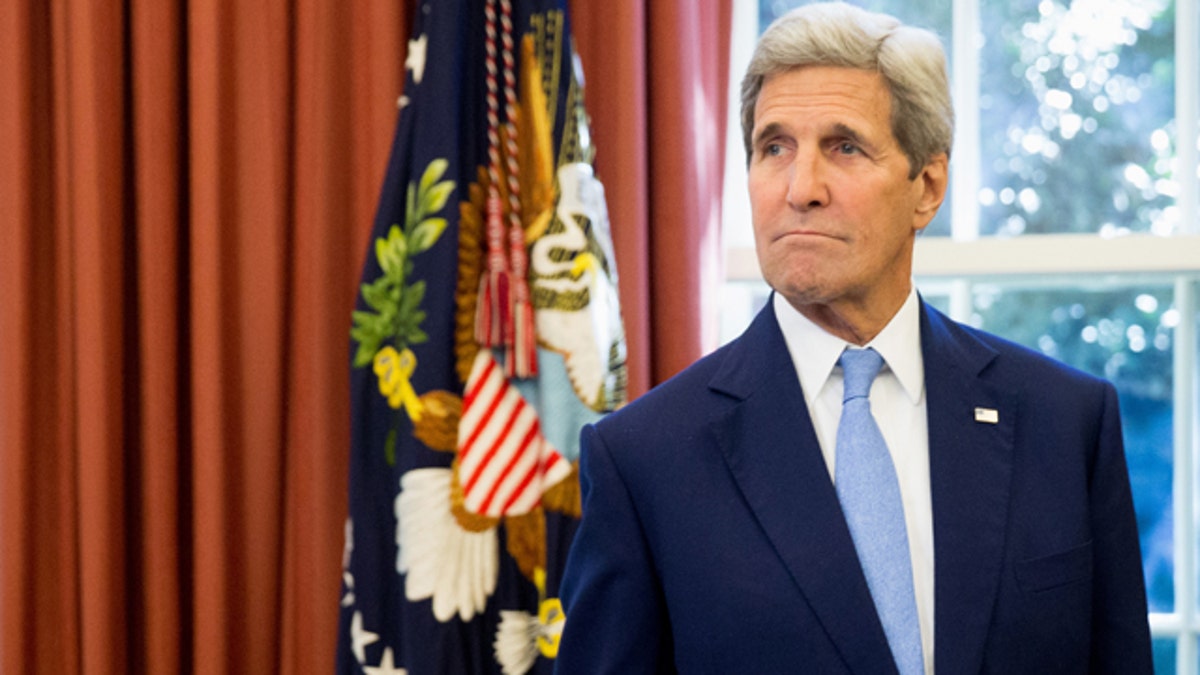
FILE - In this Sept. 15, 2015 file photo, Secretary of State John Kerry is seen in the Oval Office of the White House in Washington. (AP Photo/Andrew Harnik, File)
WASHINGTON – Amid increasing unease and uncertainty over Russia's intentions, the Obama administration plans to accept an offer from Russia for direct talks on its military buildup in Syria that U.S. officials believe is aimed at propping up Syrian President Bashar Assad.
Seeking answers to myriad questions about the precise reasoning behind Moscow's recent deliveries of material and manpower to a base in northern Syria, U.S. officials said they expect the administration to begin a military-to-military dialogue with Russia in the coming days. The Pentagon will take the lead in the discussions but the exact level, venue and timing have yet to be determined, officials said.
Those details could be announced as early as Thursday, according to the officials, who spoke on condition of anonymity because they were not authorized to discuss the matter publicly.
Secretary of State John Kerry revealed the Russian offer for talks when he told reporters on Wednesday that Russian Foreign Minister Sergey Lavrov had proposed them in a phone call a day earlier. Kerry said he personally thought the idea was a good one, but stressed that the administration was still weighing its merits. Other officials said later that national security adviser Susan Rice had signed off on the talks and that Defense Secretary Ash Carter had agreed.
After their third phone call on the Syria situation since Labor Day weekend, Kerry said Lavrov had proposed a "military-to-military conversation and meeting in order to discuss the issue of precisely what will be done to de-conflict with respect to any potential risks that might be run and have a complete and clear understanding as to the road ahead and what the intentions are."
"You have to have a conversation in order to do that," Kerry said. "It is vital to avoid misunderstandings, miscalculations (and) not to put ourselves in a predicament where we are supposing something and the supposition is wrong."
White House spokesman Josh Earnest, without commenting on specific consultations, said the Obama administration "would welcome constructive Russian support for the efforts of the anti-ISIL (Islamic State extremists) coalition in Iraq and in Syria."
Kerry said Lavrov had told him that Russia was only interested in confronting the threat posed by the Islamic State group in Syria. But Kerry stressed that it remained unclear if that position would change and Russia would mount a defense of Assad, who the U.S. believes must leave power.
"Obviously, there are questions about that," he said. "I am not taking that at face value."
However, Kerry added that if Russia is only focused on the Islamic State group, also known as ISIS, then it remains a potential partner in pushing for a political transition in Syria. "If Russia is only focused only on ISIL and if there is a capacity for cooperation ... there still is a way to get a political negotiation and outcome," the secretary said.
Kerry also said he had spoken on Wednesday with Israeli Prime Minister Benjamin Netanyahu, whose office announced earlier that he would visit Moscow next week to discuss Syria with Russian President Vladimir Putin.
Russia's military buildup in Syria has perplexed the Obama administration and left it in a quandary as to how to respond. In the afterglow of the Iran nuclear deal, which was hailed by the administration as the kind of diplomacy that can be achieved when Russia and the United States cooperate, U.S. officials had hoped for a change in Russia's position about Syria, potentially even enlisting its support to move Assad out.
Moscow's latest actions, however, have taken many by surprise and further muddied efforts to fight Islamic State militants while trying to promote political transition in Syria.
In recent days Russia has sent about a half-dozen battle tanks and other weaponry -- along with military advisers, technicians, security guards and portable housing units -- to Syria with the apparent goal of setting up an air base near the coastal town of Latakia, a stronghold of the Syrian president.
U.S. officials say Putin's intentions in Syria, particularly in the medium- to long-term, remain a mystery.




